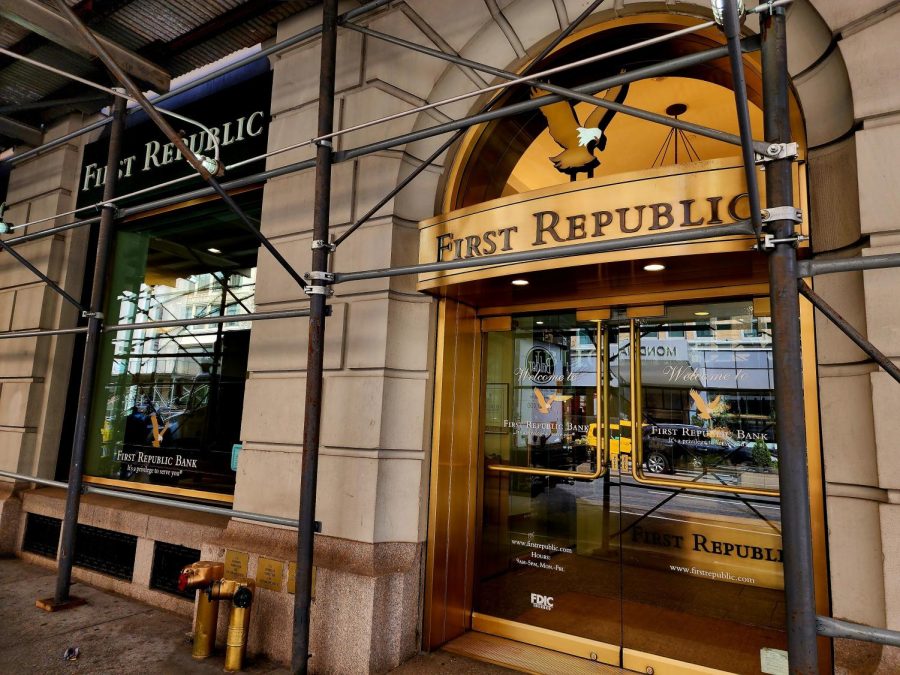First Republic Bank gets bought following second biggest bank failure
May 8, 2023
Federal regulators seized and sold First Republic Bank to JPMorgan Chase & Co. on May 1, after the bank’s first-quarter report raised concerns about its future.
First Republic Bank’s earnings statement showed that its revenue fell 13.4%, amounting to $1.2 billion. The net income decreased 32.9%, equating to $269 million. The net interest income dropped 19.4%, totaling $923 million.
First Republic Bank’s stock has plummeted 97% this year because of the ongoing banking crisis.
“With the closure of several high-profile banks in March, we experienced unprecedented deposit outflows,” Neal Holland, chief financial officer of First Republic Bank, said in the report. “We are working to restructure our balance sheet and reduce our expenses and short-term borrowing.”
Because of poor performance in the quarterly reports, the Federal Deposit Insurance Corp. invited big banks, such as JPMorgan, PNC Financial Services Group Inc., U.S. Bancorp. and Bank of America Corp. to submit bids for First Republic Bank.
JPMorgan won the bid at around $10.6 billion. Still, the FDIC will cover 80% of losses on residential mortgage and commercial loans from First Republic Bank over the next five to seven years.
Additionally, JPMorgan will receive $50 billion in financing from the FDIC.
“Our government invited us and others to step up, and we did,” JPMorgan CEO Jamie Dimon said in a statement. “This acquisition modestly benefits our company overall; it is accretive to our shareholders, it helps further advance our wealth strategy, and it is complementary to our existing franchise.”
Dimon has previously stepped up during economic uncertainty. During the 2008 financial crisis, he struck a deal supervised by the Federal Reserve to buy Bear Stearns Companies Inc., a failed investment bank. Months later, he purchased the banking subsidiaries of Washington Mutual, a savings and loans bank, for $1.9 billion.
According to Bloomberg, First Republic Bank and its advisors wanted to sell $100 billion in assets to reduce the bank’s asset-liability mismatch and avoid receivership by federal regulators. Receivership is when a corporation or trustee manages an entire company, including its assets and financial and operational decisions.
“There are a lot of concerns about the strength of the balance sheet here,” Sonali Basak, a financial correspondent for Bloomberg, said. “The hope here is that by getting rid of assets, selling these assets at above market value, there can be something here for the buyer to hang on to and help First Republic, albeit a much smaller bank.”
In an analyst call hosted by JPMorgan, Dimon described his plans with First Republic Bank. They included completely restructuring First Republic Bank by changing its name, incorporating JPMorgan’s existing systems and shifting away from adding mortgages to the balance sheet.
“Nice to see a resolution,” Macrae Sykes, portfolio manager at Gabelli Funds, told Reuters. “FRB will be in strong hands with JPM, which benefits from the accretion dynamics and further scale in wealth management. Multiple bidders shows the industry is potentially equipped to handle future issues that may arise from further duration risk on bank balance sheets.”
Dimon said he thinks the banking system is stable. He eased analyst concerns, saying the industry is “getting near the end of this particular crisis.”
Although Dimon is optimistic about the acquisition, top investors who attended the Milken Institute Global Conference — a meeting where social and economic challenges are discussed — are concerned about the deal’s implications on the U.S. economy.
PGIM CEO David Hunt, who manages $1.2 trillion in assets, said this is the start of heavy regulations on regional lenders, causing a credit crunch.
Investcorp CEO Rishi Kapoor agreed with Hunt’s sentiments, fearing that a constraint on financial conditions would create a credit crunch.
“We’re coming off of some of the fastest tightening we’ve seen in decades,” Karen Karniol-Tambour, co-chief investment officer of investment management firm Bridgewater Associates, said during the conference. “We really have not lived through such an aggressive tightening in a very, very long time. And when that happens, something is bound to break.”







